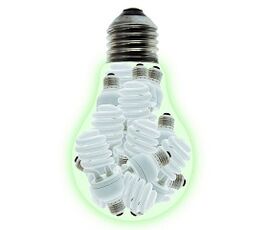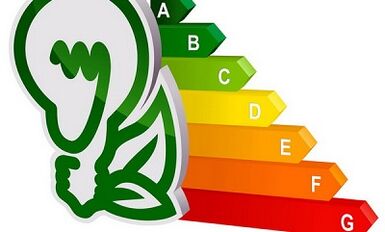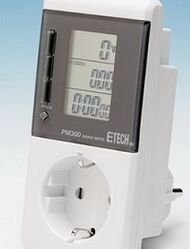The topic of electricity saving is a lot of fun.People continue to find all the known (and still unknown) ways how to do it more efficiently.Today we will share an effective way.
Of course, some of these methods are clear, and many have used it for a long time, but, however, information produced and present in the form of small instructions for careful electricity use.
Method 1. Do we really need a lot of light?

All statistics know that 14% of all electricity generated is spent on lighting.But do we always use this incredible extra energy without harming ourselves?How to learn how to do it right?
These simple tips can help you with this:
- Use as much electric light as possible.We do not urge you to return in time, when people only have daytime lifestyle (though this is certainly useful to our health: doctors have proven that active night lifestyle and artificial lighting are chronic fatigue, depression and chronic disease suppression).
- Remember that the level of room lighting is influenced by how many lighting devices are contaminated.It is clear that the plafon in the kitchen, which is not washed for several months, will be covered with a layer of dust and fat and it will be very bad to pass through the light.And pure lighting devices significantly illuminate the room, which means that you can use a light bulb.
- Don't forget about a clean window.Natural light and sunlight will not only postpone the time to turn on the lighting device, but also heat your room in the winter.
- It can be used when lighting a room, for example, combined lighting: do not turn on all bulbs in the chandelier at the same time or turn on in combination: table lamps (floor lamps) and 1-2 bulbs from chandeliers.
- Modern energy devices can help in the electric economy: Dimmers (Rotary Light -Regulators smoothly change the light level), motion sensor, impulse relay, digital switch.The automatic closing system is working very effectively at the entrance.
- We use energy absorption lamps (compact fluorescent, LED).
- And it's so easy - turn off the light when you leave the room (actually, this is probably the hardest - in many homes there is a continuous "war", as everyone forgets to turn off the light).
A little bit about the advantages of lamps -Energy Lights:
- More effective electricity use (compared to incandescent lamps 4-5 times less).
- Large light output: Energy -stored light bulbs with a capacity of 12 W in terms of light intensity are about 60 watts of regular incandescent lamps.
- It does not emit thermal energy in large quantities (this property can be used in small lighting devices) and distributes more glowing and soft light (ordinary light bulbs of no more than 10% of the energy used into the light, and the rest into thermal).
- The life of the energy light bulb service, as a rule, is longer.Although it does not always fit the service life of the declared manufacturer.
True, the latter is sometimes due to the fact that we do not use some kind of energy -saving bulbs.They often burn in places where they are used for a short time and where the mode often changes: "turned on" - "off".

If you make a replacement of the light bulb, it is advisable to start with the rooms where the bulbs work for a long time.In addition, a frequent spike in the mains, high or, rather, very low temperatures, greatly affects the duration of work.Keep in mind that some energy absorption lamps (fluorescents) cannot be used in devices with lighting adjustments.
Over time, we all need to switch to energy light bulbs, as the law on energy conservation states that incandescent lamps will be completely removed from circulation and replaced with more economical light sources.Therefore, it is best to start it first, as it immediately replaces all bulbs.
The disadvantage of unbelievable energy-saving light bulbs is still high (though they are now much cheaper than, say, 3-4 years ago), not always quality and unfortunately, we lack points for lamps (and such savings are very dangerous to us and ecology).
Well, if you can't replace a regular energy light bulb, use at least smaller bulbs.
Method 2. Multi -Tarif Meter
The question of using a multi -Tarif meter, of course, is unclear.But if we take into account that some home appliances work around the clock (refrigerator) or almost always in "sleeping" mode (TV, computer), then take into account their work at night, it may still be useful not only for fans to work at night.
In addition, the modern multi -meter takes into account electricity more precisely than induction.
Method 3. Savings are useful
First of all, let's think about whether we use home appliances properly?
The result of this thinking for most of us will be disappointing.It has been proven by experts whose home appliances often take more electricity than they need for normal operations.
As we know, many household appliances (microwaves, televisions, power supplies, audio and video equipment, water heaters, computers, air conditioning and dozen other devices) use electricity not only in work conditions, but also in "waiting" mode or, as we often say, in "sleeping" mode.
Each of these devices separately uses a lot of electricity.But if you summarize the use of all devices that work in "sleep" mode in our apartments, there is no amount obtained at all for payment on account.
Therefore, for example, the work clock in "waiting" mode for average for TV is 19 hours, for microwave-23.8 hours, for a compact 23 hours a day.
As a result, this is 5-10% of total electricity consumption in the apartment.
And what is the way out?And the output is very simple.Always turn off the device from unused outlets.
Methods 4. The miracle of technology

Obviously for everyone: you can't keep a lot with old refrigerators or TVs.Home appliances produced 15-20 years ago used electricity 2 times more.
Way out of this situation: to buy modern household appliances.How to find out how efficient energy is or the device?
To do this, carefully study the energy efficiency label, which should be in household appliances.It has a letter mark from (the highest energy efficiency class) to g (lowest).
In modern devices, the use of electricity even in "waiting" mode is less than an outdated model.
For example, indicative energy -efficient technologies, for example, "smart" dishwashers or washing machines, which automatically dose, water use, select the desired regime.According to experts, the device uses 44% less energy and 62% of water from outdated models in the late 90s.
It does not necessarily convince the advantages of modern technology.But what if not everyone can replace old household appliances with new (usually expensive)?How can I reduce the cost of electricity in this case?
Method 5. We use what we have
Refrigerator
How to use the fridge, maybe everyone knows.However, we insist on putting it next to the battery, kitchen or near the wall on a bright side.
But it is clear that, heated from nearby heat sources, the refrigerator for effective work will use more electricity.
In addition, it is advisable that in a room where the refrigerator stands, it is not hot (about 18-20 degrees), the refrigerator should be often diluted and released from ice, check the tension (sealing at the refrigerator door), do not place on the wall for better air circulation.
Also, you can't buy a large fridge just because it's stylish or like a neighbor in the kitchen (continue from the number of family members and their needs).The larger the refrigerator, the more it uses energy.
Vacuum cleaner
For the usual operation of a vacuum cleaner with less electricity consumption, it must be regularly cleaned from accumulated dust (dirty using 15-20% more) and considering that it uses the most electricity when turning on and off (if you empty the small room, try not to turn off too often).
Electric compensation
An electric kitchen uses a lot of electricity.How can I reduce the cost of electricity in this case:
- Do not heat the oven first, if this is not provided for a recipe for cooking dishes.
- Use the heat of the fireplace (turn 5-10 minutes before the end of the cooking).
- Cover the pot with a lid.
- Do not use excess water when cooking vegetables and eggs.
- Use a good dish with a flat bottom and a burner size.
- Use a pressure cook.
- Use an electric kettle (it uses less electricity than an electric kitchen), while buying enough electric kettles for the whole family and pouring plenty of water into it as you use at a time.
- Use a microwave and a toaster oven, where you can cook the same delicious and crunchy dishes in just minutes than in the oven.But this is faster, and, therefore, is more economical.
Washing machine
The washing machine spends up to 15% of the home electricity.Use all possible economic electricity consumption, provided by instructions for your washing machine:
- Quick and economical washing mode.
- Complete load, but without load (excessive load increases electricity consumption by 10%).
- Lower temperatures (not necessarily wash at high temperatures).
- Properly selected operating mode.
Iron
- Here you can also apply the principle of heat heat, that is, turn off the iron 5-10 minutes before the end of the setting.
- Do not dry linen: for its stroke, you need to spend more time, and, thus, use more electricity.
- Unexpected linen also requires additional electricity consumption.
- Use iron with automatic closing function.
- Properly use modes to iron various types of fabrics.
Air conditioner
- Set enough temperature to cool the room properly.
- Before turning on, make sure all windows and doors are closed.
- When buying air conditioners, focus on the size of the room and the number of people in it.Devices designed for large areas, will only "eat" electricity without any benefits.
- Fans and filters are regularly cleaning.
Computer
Almost everyone has a computer today and there is no one in the family.And, it is clear that this significantly increases electricity costs.
What can we do?
- Reduce the brightness of the monitor (this affects energy consumption).
- Turn off the computer if you haven't used it for a long time.
- Turn on all peripheral devices (scanners, printers, modems) through the network filter and always turn off when the device is not working.
- If possible, use a liquid crystal monitor.
- Use laptops more often (it "eats" less energy than stationary computers).
Heater
Cold on the road and at home makes us get a heater from the pantry.No warmth at home?What to do?Furify and reluctant to get sick.So you need to insert an electric "eater".
To reduce the time of use of the heater, you need to protect everything as possible: windows, walls, floors and so on.Of course, plastic windows do this well.Well, if the window is normal, try closing all the cracks and cracks in the window frame.It passes through them up to 50% of the heat.The same thing must be done with the front door.
And if the central heating is turned on, but still cool?
There may be many reasons.But in some cases, cleaning the old battery, replacing or increasing their heat transfer due to an increase with additional parts can help.
Well, try using a heater, if possible, don't use it, they are very "enthusiastic".
Also, as an additional heat source option in the apartment, you can consider the heated towel rail, which is connected to the hot water supply.
Interesting about the same

There are very useful devices.It's called "household wattmeter."
Why is it necessary?It will help save electricity.With the help of these small devices, you can learn many interesting things about their home appliances and generally about home electricity expenses.
For example:
- How much do you pay for a computer that doesn't turn off all day?
- How much electricity does your refrigerator eat and is it time to turn it into a new one?
- How much electricity you eat when you wash the dishes on the dishwasher, wash, stroke or dry your hair?
- How much energy does your TV eat abroad?
You will receive answers to all these questions and more, and you will also know how much electricity is spent without interest and what you can keep.
Obviously, saving electricity is not very difficult.The main obstacle, perhaps, is made up of ourselves.Once we realize that we do not waste electricity in vain is profitable, first of all, for us - we will succeed.
























